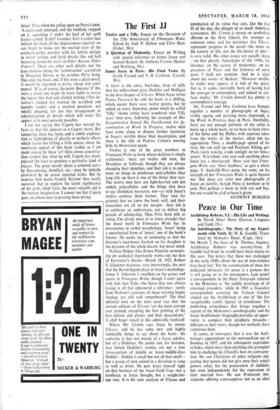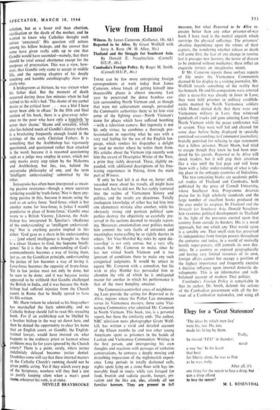Peace in Our Time
An Autobiography : The Story of my Experi- ments with Truth. By M. K. Gandhi. Trans- lated by Mahadev Desai. (Cape, 16s.)
ON March 7, the feast of St. Thomas Aquinas, Archbishop Roberts was- seventy-three. If Gandhi had lived, he would have been ninety-six this year. The letters that these two exchanged in the early 1940s about the use of non-violence have been lost. Yet the canonisation of these two dedicated advocates for peace is a process that is still going on in the newspapers. Last month a correspondent in the Daily Telegratih referred to the Mahatma as 'the saintly prototype of all unarmed crusaders,' while in 1965 a Guardian correspondent covering the Vatican Council singled out the Archbishop as one of 'the few recognisably saintly figures' in attendance. The publishing coincidence that brings together a reprint of the Mahatma's autobiography and the Jesuit Archbishop's biography provides an oppor- tunity to compare their prophetic missions— different as their views, though not methods, have sometimes been. _ It seems, in retrospect, that it was the Arch- bishop's appointment to the metropolitan see of Bombay in 1937, and his subsequent experience in India, which more than anything else prompted him to challenge his Church's ban on contraeep- tion. He saw Christians of other religions stig- gesting that nature did not give men their seittihl powers solely for the procreation of children, but even independently for the expression of their married love. He saw Protestant mis- sionaries offering contraceptives not as an ideal
solution, but as a lesser evil than abortion, sterilisation or the death of the mother, and he wanted to know why Catholics thought such advice 'unnatural.' His question still echoes among his fellow bishops, and the answer that some have given really adds up to one that Gandhi would have seconded—namely, that there should be total sexual abstinence except for the purposes of procreation. This was a view, how- ever, that Gandhi only came to accept in middle life, and the opening chapters of his deeply touching and humble autobiography show pre- cisely why.
A bridegroom at thirteen, he was sixteen when his father died. But the moment of death occurred during those few minutes when he had retired to his wife's bed. 'The shame of my carnal desire at the critical hour . . . was a blot I have never been able to efface.' In the fifth and final section of his book, there is a give-away refer- ence to the poor who have only a...191940th `to cover their shame.' Shame and sexuality, which also lies behind much of Gandhi's dietary reform, is a bracketing frequently enough found in the writings of the early Christian Fathers. It is something that the Archbishop has vigorously questioned, and questioned rather than attacked is the word, because it is reasoned questioning such as a judge may employ in court, which not only marks every step taken by the Mahatma and Archbishop, but lies, too, behind the satyagraha philosophy of one, and the term 'intelligent understanding' submitted by the other.
Satyagraha has often been interpreted as mean- ing passive resistance—though a more accurate rendering would be `truth-force.'Nor is there any- thing passive in this, because it means using the soul as an active force. 'Soul-force, which is but another name for love-force, is [what I would] popularise in place of brute-force,' Gandhi once wrote to a British Viceroy. Likewise, the Arch- bishop has interpreted St. fgnatius's 'obedience of the understanding' as 'intelligent understand- ing.' Nor is anything passive implied in this either. 'God gave us a share in his understanding . . . [and when] intelligence is brought in, there is a closer likeness to God, the Supreme Intelli- gence.' So it is that the understanding of God's commandments becomes a way of loving them, just as, on the Gandhian principle, understanding the justice of law becomes a way of loving it. Love-force becomes the opposite of brute-force. Yet in law justice must not only be done, but be seen to be done; and it was because justice appeared to be withheld that Gandhi challenged the British in India, and it was because the Arch- bishop had suffered injustice from the Church courts in Rome that he finally agreed to have his life written.
Mr. Hum (whom he selected as his biographer) has marshalled the facts admirably, and no Catholic bishop should fail to read this revealing book. For if an archbishop can be libelled by a brother bishop in the way set down here, and then be denied the opportunity to clear his name that an English court, or Gandhi, the English- trained lawyer, would have insisted on, what happens to the ordinary priest or layman whose problems may lie for years ignored by the Church courts? There is a point, surely, where justice indefinitely delayed becomes justice denied. Doubtless some will say that these internal matters in the Catholic Church's running should not be given public airing. Yet if they search every page of the Scriptures, nowhere will they find a text to justify keeping silent when 'a man's good name, whatever his rank, is at stake.
NEVILLE BRAYBROOKE



































 Previous page
Previous page